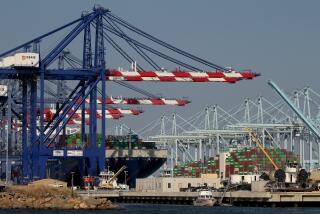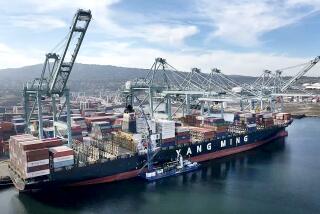Losses, Fraud Hit Lloyd’s of London
- Share via
For nearly three centuries, Britain’s venerable insurance market, Lloyd’s of London, has withstood and richly profited from the periodic turbulence characteristic of the property-casualty insurance business. But the 1980s have been exceptionally unkind to the industry worldwide--and now Lloyd’s is proving not to be immune.
Lloyd’s, whose entrepreneurial zeal in insuring almost anything from a communications satellite to a starlet’s bust is matched by shrewd assessments of the actual risks involved, paid out more in claims than it received in premiums in 1981, the most recent year for which figures have
Investment Income
The $55.7-million underwriting loss (based on current exchange rates) was more than offset, however, by investment income earned from the premiums, resulting in a net profit of about $195 million.
Still, that was the market’s slimmest profit since 1977. And 1982, now being audited, could produce the exchange’s first net loss since 1965 and 1966, though not as great as the 8% loss in those years, Lloyd’s Chairman Peter North Miller said in an interview last week in Los Angeles.
Miller laid much of the blame for Lloyd’s change of fortune not to the cutthroat competition for premium income that has damaged or destroyed many a U.S. insurer but to liability litigation and extravagant court awards in this country. Lloyd’s does 35% of its business in the United States, he said. “The courts in America tend to throw liability around a bit,” Miller said.
He added this warning: “Without reform of tort law in the U.S., there will not be a market to cover the liabilities that Americans want to see covered.” He cited pollution-cleanup insurance, which is now both required and difficult to find as a result of regulatory uncertainty in this country and multibillion-dollar litigation such as what followed New York’s Love Canal disaster.
Miller has been voicing his warning across the United States, speaking to the National Assn. of Insurance Brokers at Sea Island, Ga., and then on the West Coast last week. Today, he heads for Kansas City to address state regulators attending a meeting of the National Assn. of Insurance Commissioners.
As if underlining the urgency of the industry’s concern, a San Francisco Superior Court jury decided May 31 that Manville Corp., which is struggling with massive damage claims for asbestos poisoning from exposures dating back decades, had liability insurance during key periods over more than half a century ago--even though the actual policies could not be found and the originating companies have since merged into others.
That was good news for Denver-based Manville, but it sent another shudder through the already reeling property-casualty insurance industry.
Interpretation of Liability
Court interpretations have in the past led to huge liability awards and created uncertainty for insurers, Miller said. Insurers must be able to calculate the true nature of the risks they are underwriting, he explained, and that is complicated by shifting interpretations of what constitutes liability.
“Lloyd’s will insure almost anything,” he said, “ provided we can know what is required of us.”
After the tanker Torrey Canyon foundered in the English Channel in 1967, spilling massive amounts of oil on British and French beaches and oyster beds, he said, it became impossible to get insurance against such a disaster. Lloyd’s finally offered to provide coverage but only on specified terms.
“We said, ‘Let’s sit down and talk about what it is we can provide,’ ” Miller said, “and it’s a helluva lot.”
No one questions Lloyd’s ability to withstand present adversities within the insurance market. Lloyd’s record is superb compared to that of the industry in general. And its security is rock solid, with an estimated $12 billion of reserves on top of $5 billion of premium income.
Far more uncharacteristic is the persistent whiff of financial scandal that has tainted a handful of its 384 insurance syndicates in recent years--scandals regarding misuse of member funds. These events, whose very rarity provoked considerable press attention, triggered an investigation that produced a 1982 parliamentary reform increasing the authority of Lloyd’s management to regulate the agents and brokers who do business in its bustling Underwriting Room in the City of London (which is to be abandoned early next year for new and far more spacious quarters across the street).
Clubby Tradition
The scandals have also called into question Lloyd’s clubby traditions in which a member’s word is considered sacred, a handshake binding and full disclosure assumed. Those traditions have shaped the Lloyd’s heritage of always paying off on claims--whether during the Napoleonic wars, in the wake of the San Francisco earthquake or after last year’s loss of a communications satellite and the destruction of a Korean airliner over Soviet territory.
“Very poor accounting” between Lloyd’s member-investors and the agents who represented them in insurance dealings underlie the allegations of fraud, Ian Hay Davison, Lloyd’s chief executive, told an American audience last year. “The fact is,” Davison acknowledged, “Lloyd’s ethical rules had got out of date.”
Tighter Screening
Because “four or five” of those who work at Lloyd’s had taken advantage of the situation to “plunder,” Davison said, Parliament and Lloyd’s officers have stiffened the exchange’s ability to discipline its members, tightened the screening of agents and increased disclosure of their financial interests to avoid the conflicts of interest that underlay the string of scandals reaching back to the late 1970s.
“I can assure you that the record will be put straight publicly and nothing will be swept under the carpet,” Davison told the Americans.
Nonetheless, the unthinkable has since occurred: Several hundred members of Lloyd’s insurance syndicates managed by Richard Beckett Underwriting Agencies refused to pay their shares of a $77.5-million claim due last May 31. Lloyd’s quickly extended the deadline to July 31, but it remains uncertain whether that deadline will be met.
“When you have been subjected to massive fraud and suffered losses from fraud, defalcation, incompetency and negligence, you have no confidence in unaudited figures,” Geoffrey Lawson, a Lloyd’s member looking into the losses, told Business Insurance, which covers the industry, last week. “I will not pay one penny until I know that these losses are true trading losses. And,” Lawson added, “a substantial number of members cannot or will not pay their calls.”
Under Lloyd’s rules, members of a syndicate are individually liable to cover losses to the full extent of their private fortunes. Lloyd’s itself--being an insurance market or society of underwriters and not a company--provides the facilities and staff for conducting business but accepts no liability for the risks insured in its Underwriting Room.
Formed Special Unit
The syndicates managed by Richard Beckett may have lost up to $162.5 million since 1979. Their members paid Lloyd’s $48.8 million last year, Business Insurance reported, much of which was offset by recovered funds. It is the balance of that sum that is due by July 31.
Lloyd’s formed a special unit last week, Miller said, to take over the affairs of the troubled syndicates. But he pledged no leniency in enforcing Lloyd’s policy of complete individual liability to pay losses, whether prompted by fraud or misfortune.
“The ‘name’ (member) is responsible for his agent--if he is competent or incompetent or even a wrongdoer,” he explained.
Given that only several hundred of Lloyd’s 26,000 “names” are involved, he observed, “it’s relatively a very small problem--though, clearly, it’s very acute for the members involved.” They face personal losses of up to $250,000.
Miller, 54, played a key role in the reforms strengthening Lloyd’s ability to regulate the underwriting that takes place within the institution, which grew out of Edward Lloyd’s coffee house in Tower Street sometime in 1688, where ships’ captains, merchants and shipowners gathered to gossip and do business.
Partly as a result of his reform efforts, Miller was tapped in 1984 to succeed Sir Peter Green on his retirement as Lloyd’s chairman. He was named to a further one-year term this year.
Lloyd’s, he said, will continue to help its members discharge their responsibilities--”short of paying for their losses.”
More to Read
Inside the business of entertainment
The Wide Shot brings you news, analysis and insights on everything from streaming wars to production — and what it all means for the future.
You may occasionally receive promotional content from the Los Angeles Times.










